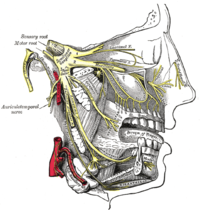
Photo from wikipedia
OBJECTIVE To compare the effectiveness and safety of galcanezumab, fremanezumab, and erenumab for the treatment of chronic and episodic migraine, through real-world data. BACKGROUND Monoclonal antibodies (mAbs) targeting the calcitonin… Click to show full abstract
OBJECTIVE To compare the effectiveness and safety of galcanezumab, fremanezumab, and erenumab for the treatment of chronic and episodic migraine, through real-world data. BACKGROUND Monoclonal antibodies (mAbs) targeting the calcitonin gene-related peptide (CGRP) pathway have been tested extensively in several clinical trials for both episodic and chronic migraine, showing high effectiveness, safety, and tolerability; however, there are no prospective real-world studies intending to compare their efficacy and safety. METHODS This is a prospective observational cohort study comparing the effectiveness and safety profiles of galcanezumab, fremanezumab, and erenumab for the treatment of chronic and episodic migraine. We enrolled 140 patients at the Headache Centre of University Federico II of Naples, with a history of multiple failed treatments with validated migraine preventatives. Framenezumab, erenumab, or galcanezumab were administered for 12 months. The mean monthly days with headache, Migraine Disability Assessment (MIDAS) score, and adverse events were evaluated during the run-in period and every 3 months by reviewing standardized paper patient headache diaries. RESULTS We found a mean reduction of migraine monthly days from baseline of -12.0 (-9.8, -14.1) in the galcanezumab group, -12.3 (-10.2, -14.3) in the fremanezumab group, and -10.8 (-8.5, -13.1) in the erenumab group (for all, p < 0.001). We found a mean reduction of MIDAS score of -32.6 (-26.6, -38.5) in the galcanezumab group, -33.4 (-28.0, -38.9) in the fremanezumab group, and -29.2 (-23.0, -35.4) in the erenumab group (for all, p < 0.001). We found no significant differences between mAbs in the reduction of mean monthly days with headache and MIDAS score. We found a more rapid effect of galcanezumab and erenumab compared to fremanezumab in medication overuse headache patients after 3 months of treatment (-10.8 and -11.1 vs. -4.0 days; p = 0.029). CONCLUSION Our results confirm the therapeutic benefits of anti-CGRP mAbs. There is no evidence that suggests that one antibody may be superior to the others in terms of effectiveness, both in chronic and episodic patients.
Journal Title: Headache
Year Published: 2023
Link to full text (if available)
Share on Social Media: Sign Up to like & get
recommendations!